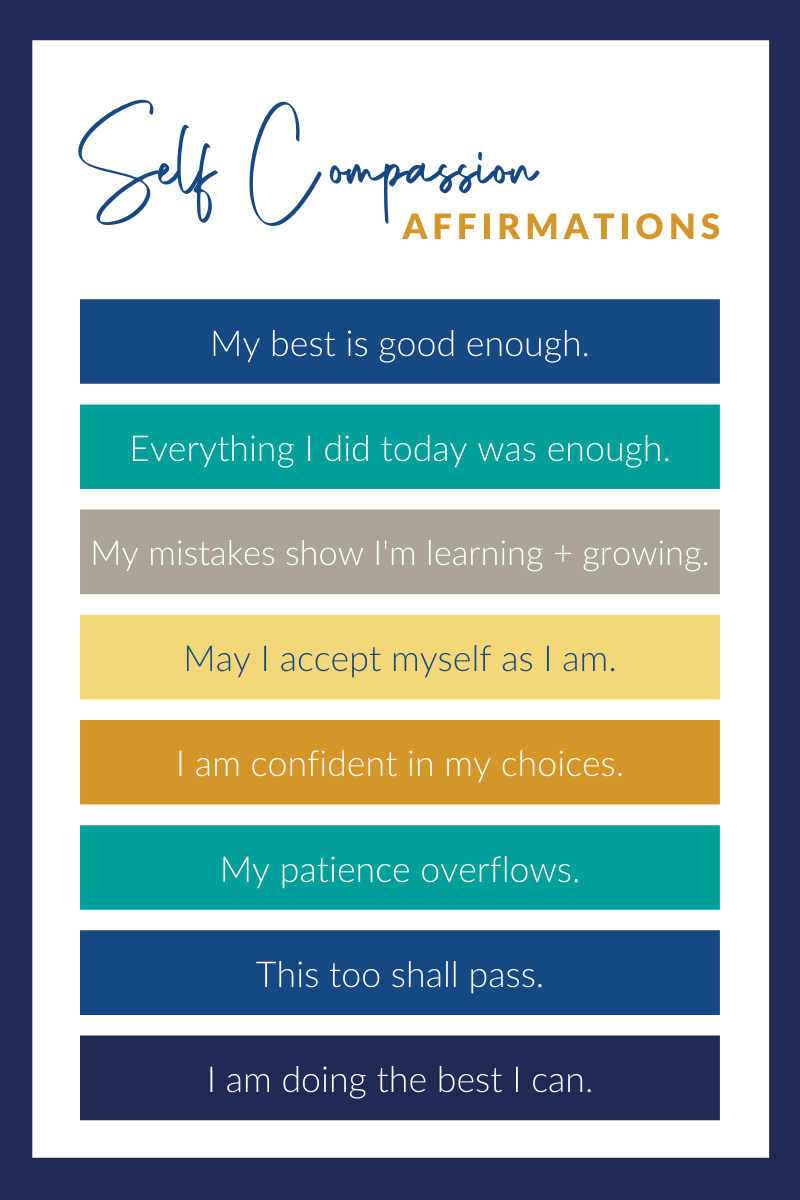Self-Compassion Affirmations
A Self-Compassion Practice for Difficult Times
My baby was crying. My toddler was screaming. My husband was at work and I felt so alone and helpless.
I walked into the bathroom to escape and take a break. When I looked in the mirror, I saw a sticky note that said:
This too shall pass.
I felt my jaw soften and my shoulders relax. I took a deep breath and returned to the melee.
That sticky note certainly didn’t fix anything but it did take the edge off and interrupted my reactivity to the situation.
Little reminders like that can make a big difference in how we experience difficult times.
The time after the birth of my second child was particularly hard for me. At some point, I had the idea to write affirmations for myself and that ended up being so helpful.
When creating these affirmations, I would first call up a negative emotion or challenging experience I had been working with. Then I would act as my own best friend and say what I needed to hear.
For example, feelings of isolation and loneliness prompted me to write I feel connected to a sacred network of mothers.
While I’m skeptical of some of the far-reaching claims the wellness world makes about affirmations, I do know they have been helpful to me. For the most part, I’m just looking to capture the feeling an affirmation provides.
When I read or say an affirmation I’ve written, I usually feel my body relax. I’m intentional about the words I use so they are inspiring or calming in a way that interrupts the mental hamster wheel of negative thoughts.
Creating Your Own Affirmations
Creating your own affirmations is a self-compassion practice that invites you to tend to yourself in the same way you would to a dear friend or loved one—as opposed to judging yourself or beating yourself up.
Self-compassion recognizes that suffering is part of the human experience and not exclusive to just you. In addition, self-compassion requires mindfulness to observe negative thoughts and emotions without over-identifying with them, so we’re not swept away by reactivity.
Call to mind the stressor or difficult issue you’re hoping to work with.
Then be your own best friend and respond from a place of warmth and understanding.
Typically, affirmations are “I” statements written in the present tense. Call me a rebel, but I don’t always follow this rule. I also like the openness that “May I” statements provoke. Sometimes what I write doesn’t even have the word “I” in it at all. I’m sure affirmation purists would balk at the liberty I take here but really what I’m going for here is for my words to elicit a nervous system response.
I know I’ve written something powerful when my words elicit a visceral response.
Example 1:
Part of my family’s COVID experience included homeschooling. I noticed a lot of perfectionism creeping in as I undertook the role of Homeschool Teacher. I needed a reminder that perfectionism isn’t helpful so I wrote:
Striving for perfection robs me of beauty, meaning, and growth.
Example 2:
Despite making healthy choices and taking good care of myself, I still experienced a health event that left me feeling fragile. I felt mad at my body because it didn’t work the way I wanted it to. I needed a reminder that some parts of my health are simply out of my control and that even though this bad thing happened, my body is still worthy of love and care. I wrote:
May I accept myself completely, just as I am.
How to Use Self-Compassion Affirmations
Return to this practice in difficult times. Keep your affirmations handy so you can pull strength from them throughout the day.
Sometimes, I keet a list next to my bed and read through them each day before getting up.
You could also write some of the most powerful affirmations on sticky notes and place them in high traffic areas like the bathroom mirror, the refrigerator, or the TV remote.
Self-Compassion Affirmations for Difficult Times:
Change is never easy but it’s easier if I stop being so hard on myself.
I am free to let go of other’s judgments.
My mistakes show that I’m learning and growing.
I savor the sweet moments of this challenging season.
My patience overflows.
I feel content doing less.
Striving for perfection robs me of beauty, meaning, and growth.
I take time to be creative.
I’m not the only one having a hard time right now.
I feel connected to others suffering in this moment too.
I am confident in my choices.
I trust my intuition.
Everything I did today was enough.
My ability to love even in hard times is a powerful gift.
May I accept myself as I am.
May I have courage.
May I know that others struggle along with me.
I am doing the best I can.
My best is good enough.
This too shall pass.
Conclusion
I hope you’ll find these affirmations helpful and that maybe you’ll feel inspired to create some of your own.
If you’re really struggling during a difficult time, consider the support of a therapist; a skilled therapist can help you navigate all the changes that come with the difficult seasons of our lives.







